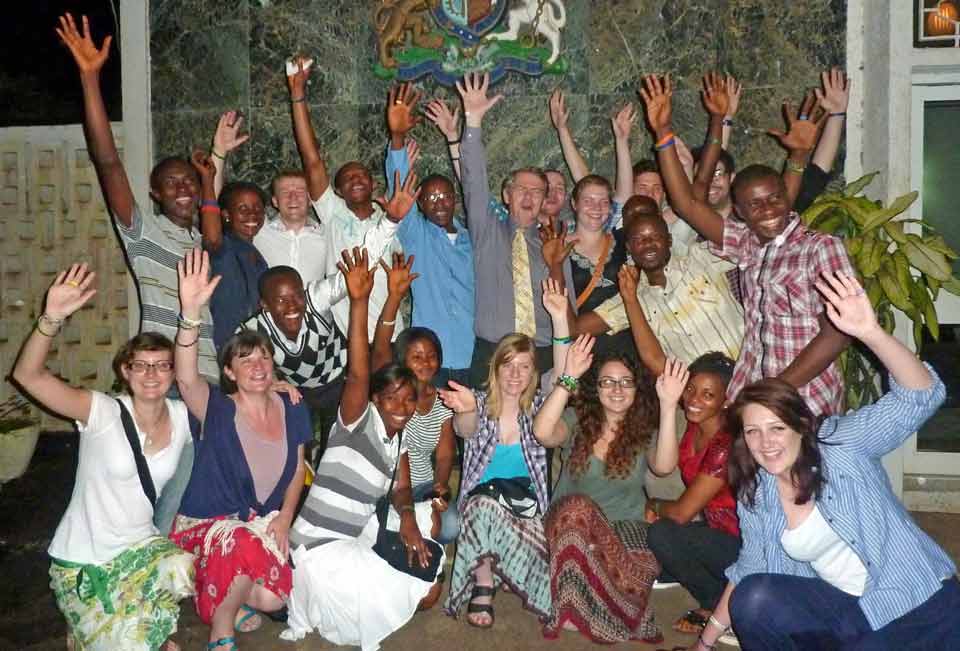Guest Post: The International Citizen Service (Adventures in Sierra Leone)
I met Emma Baker recently when she spoke at an evening of microlectures at the Royal Geographical Society, and I really enjoyed what she had to say.
My world revolves around conservation, and because of that I think I’m often guilty of forgetting the importance of humans in the equation. International development, in particular youth education is important in it’s own right; but undoubtedly it is also one of the strongest tools we have to drive conservation around the world.
I can reel off a long list of names when people ask me for advice on conservation volunteering, but when asked about community or development projects, I’m stumped. I know of a few organisations, but (at the risk of being controversial) they largely seem to me to be mostly-feel-good-adventures. ‘Voluntourism’ I think is the appropriate modern acronym.
So when I heard Emma talk about her experiences in Sierra Leone and the great work that she was supporting, I quickly asked if she would share her experiences here. Over to Emma…
Once an International Citizen, always an International Citizen!
http://www.jamesborrell.com/wp-content/uploads/2013/04/Creating-a-work-of-art-on-a-hand-washing-day-at-the-local-hospital.jpgInternational Citizen Service (ICS) is an exciting volunteer programme for 18-25 year olds, funded by the Government’s Department for International Development. ICS gives young people the opportunity to work in partnership to fight poverty through sharing skills, building capacities and making positive changes to the lives of people in disadvantaged communities, whilst becoming ‘active citizens’ in the process. With only three months to achieve all of this, there’s certainly not time to put your feet up!
Volunteers can be sent to one of 28 developing countries across the world, as chosen by their ‘sending’ organisation: VSO, Tearfund, Restless Development, Raleigh International, Progressio or International Service. All volunteers are encouraged to fundraise at least £800 towards their sending charity, but apart from that, all costs (including flights, visas, insurance and even a personal allowance) are covered. So what’s the catch?
Well the truth is, there isn’t one, or not one that I’ve discovered. I volunteered in Sierra Leone, West Africa, last year and would recommend the experience to anyone. One of the best things about ICS is its selection process; you don’t need any particular qualifications or previous experience, as long as you’re motivated, positive and committed to the values of the programme.
So here are my three reasons to volunteer with ICS, and why I think it stands out as a front runner in the field of overseas volunteering:
1) ICS is COLLABORATIVE…
People are at the heart of this programme, from the communities who host ICS volunteers to the personal development of the volunteers themselves.
Young people from the UK are matched with an equal number from the host country, so that each person has a ‘counterpart’. This was a definite highlight for me, as we could achieve so much more with a team of nine from the UK and nine from Sierra Leone. Counterpart pairs worked side by side in placements with grassroots NGOs, coming together for ‘Global Citizenship Days’, where we discussed issues affecting both the UK and Sierra Leone, such as teenage pregnancy, human rights and gender discrimination. But more than that, we became close friends with our counterparts and learnt a huge amount from each other.
2) ICS is VARIED…
No two ICS projects are the same, even within one country!
I was placed in a local NGO with three other volunteers (1 from the UK and 2 from Sierra Leone), working with local youth groups on governance and gender initiatives, whereas other volunteers were tackling subjects such as HIV/AIDS, human rights and business skills training. What’s more, ICS is what you make of it and as a team we were encouraged to use ‘Community Action Days’ to confront issues we cared about within the community, through raising awareness or creating change. For us, this included a hand-washing day at the local hospital, a march on World AIDS day and a Peace Carnival in the run-up to the national elections.
3) ICS is CHALLENGING…
http://www.jamesborrell.com/wp-content/uploads/2013/04/Emma-left-with-her-African-family.jpgICS may not be physically challenging but it does push you to your limits mentally and emotionally. Three months can feel like much longer when you factor in adapting not only to a new job (albeit a temporary one) but a whole new way of life too. Where possible, volunteers are placed with host families and this can present new challenges on a daily basis, from language and food to religious and cultural differences. In just three months with my host family, we experienced illness, theft and violence, as well as celebrating good news and birthdays. We went through so much together that actually it was saying goodbye that proved to be one of the hardest parts!
Finally, being an ‘international citizen’ does not stop at the end of the three month placement. Volunteers are encouraged to undertake an ‘Action at Home’ project, putting the skills and knowledge gained overseas to use within their own communities. Once an international citizen, always an international citizen!
To find out more or to get involved, go to the ICS website: www.ics-uk.org.uk, or find it on facebook: https://www.facebook.com/ics?fref=ts.
To read more about Emma’s experiences, see her blog: www.adventuresinsierraleone.wordpress.com.
Like:
Share:


